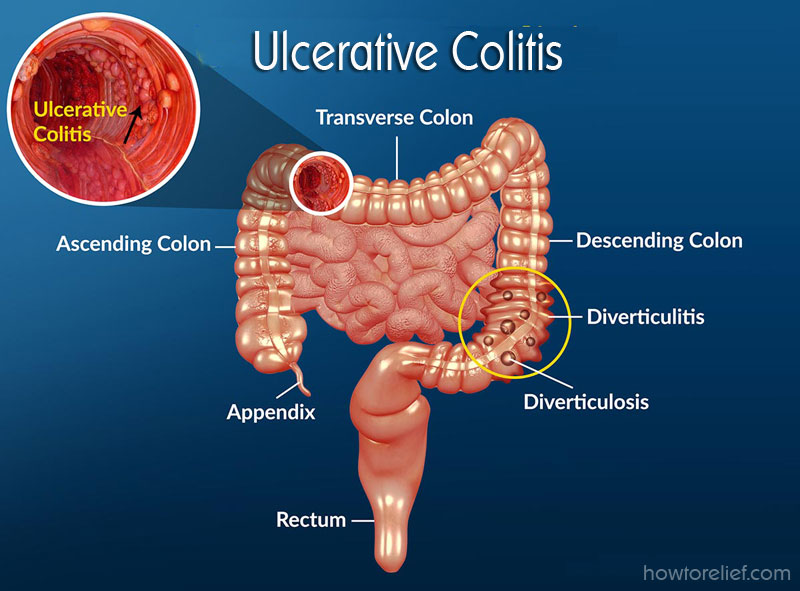Ulcerative Colitis: Ulcerative colitis a chronic disease of the large intestine, also known as colon, in which the lining of the colon becomes inflamed and develops diminutive open sores, ulcers, that engender pus and mucus. The inflammation and ulceration can cause abdominal discomfort and frequent empty of the colon. It’s important to understand the distinction between ulcerative colitis and Crohn’s disease.
Crohn’s disease can affect any component of the Gastrointestinal (GI) Tract, but ulcerative colitis affects the only colon. Additionally, Crohn’s disease can affect all layers of the below wall, ulcerative colitis affects the only lining of the colon.

Both colitis and Crohn’s disease are types of Inflammatory Bowel Diseases (IBD), not should be confused with Irritable Bowel Syndrome (IBS), a disorder(IBS) that affects muscle contractions of the colon. Irritable Bowel Syndrome (IBS) is not characterized by inflammation of the intestine.
Symptoms of Ulcerative Colitis
About half of the patients with ulcerative colitis experience mild symptoms. Be sure to consult your medico if you experience any of the following sign of sickness:
- Bowel movement becomes looser and more urgent.
- Frequent diarrhea accompanied by abdominal pain and blood in the stool.
- Stool generally bloody
- Abdominal pain(crampy pain)
People who suffer from ulcerative colitis often experience loss of appetite and may lose weight. A feeling of low energy and fatigue is additionally common. In younger children, ulcerative colitis may delay magnification and development.
Symptoms of ulcerative colitis are also come and go, with fairly long periods in which patients may also experience no distress at all. This remission can span months to years, but symptoms do eventually return. The capricious(unpredictable) course of ulcerative colitis may make difficult for doctors to evaluate whether a particular medication has been effective or not.
You May Also Like:
- Super Fast Weight Loss Pill- Garcinia Cambogia (Malabar Tamarind)
- What Is Diabetes Mellitus: Symptoms, Risk Factors, Causes And Treatment
- What Is The Symptoms Of Cervical Spondylosis And Home Treatment Guideline
Causes of Ulcerative Colitis
Considerable progress has been made in IBD research, investigators do not yet ken what causes this disease. Studies betoken that the inflammation in IBD involves an involute interaction of factors: the genes that person inherited, the immune system, and an environment. Foreign substances(antigen) in the environment may be the cause of inflammation, or they may stimulate the body’s defenses mechanism to engender an inflammation that continues without control.
More than 907,000 Americans are affected by ulcerative colitis. Men and Women are equally likely to be affected, and most people are diagnosed in their mid-30s. The disease can occur at any age and older men are more likely to be diagnosed than older women.
While ulcerative colitis tends to run in families, researchers have been unable to establish a clear pattern of inheritance. Studies show that up to 20 percent of people with ulcerative colitis will also have a close relative with the disease. The disease is more common among white people of European origin and among people of Jewish heritage.
Diagnosis of Ulcerative Colitis
The physician asks about your symptoms, do the physical exam, a number of tests. Testing can avail the doctor rule out other problems that can cause homogeneous symptoms, such as irritable bowel syndrome, Crohn’s disease, and diverticulitis.
- Tests that may be done include:
- Colonoscopy. In this test, a thin, lighted tool to look inside of your entire colon. At the same time, the doctor may take a sample of the lining colon(biopsy).
- Blood tests look for inflammation and infection.
- Stool sample for blood, white blood cells, and infection.
Treatment for Ulcerative Colitis
Ulcerative colitis affects everyone differently. Your physician will avail you find treatments that reduce your symptoms and avail you avoid flare-ups.
If symptoms are mild, you need only over-the-counter medicines for diarrhea. Verbalize with your physician before you take this medication.
Many people need prescription medication, such as aminosalicylates, steroid, or other medications that reduce the body’s immune response. This medication can stop or reduce symptoms and obviate flare-ups.
Some people complain that some foods make their symptoms worse. If this, not eats those foods. But be sure to eat healthy food, diet to keep your weight up and to stay vigorous. If you have astringent symptoms and medication don’t help, you may need surgery to remove the colon. Removing colon that cures ulcerative colitis. It additionally obviates colon cancer.

